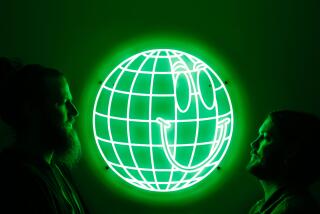Entrepreneur turned Geek Squad into a geek army
- Share via
Minneapolis — Robert Stephens recalls with precision the night he signed the deal that would put his sassy start-up, Geek Squad, under the massive corporate umbrella of Best Buy.
Parked in an alley outside the lawyers’ office in downtown Minneapolis, Stephens and his mentor, Platinum Group founder Dean Bachelor, toasted the future with a $400 bottle of champagne. It was October 2002, and Stephens, then 33, was plotting the new heights to which he could take Geek Squad, the computer repair company he had started in college.
“I felt like a fighter pilot stuck in a crop duster,” Stephens said. “I couldn’t wait to get to Best Buy and learn how to take off in a Boeing 777.”
Since then, Geek Squad has grown from 60 employees and nearly $3 million in sales to the world’s largest tech-support operation with annual revenue of $1 billion to $1.5 billion, analysts say.
About 24,000 “agents” worldwide come to work each day dressed in white button-down shirts, black pants and clip-on ties. They still make house calls in iconic black-and-white “Geekmobiles” and are set up in all of Best Buy’s 1,143 U.S. stores.
Geek Squad remains Best Buy Co. Inc.’s killer app -- something that sets it apart from other nationwide chains, even more so with the demise of Circuit City. And the Geeks might be more important than ever to the company’s future.
As Wal-Mart, Sam’s Club, Target and Costco sell more computers and flat-screen televisions, they too are getting into the customer service game. None uses staff to trouble-shoot and do installations, however.
“Geek Squad’s going to become a bigger and bigger component of their core strategy,” said Mitch Kaiser, an analyst with Piper Jaffray in Minneapolis. “Beyond driving sales, it increases customer satisfaction. Best Buy becomes the trusted advisor and the IT staff for the individual.”
Crucial to the success of the quirky Geek Squad brand has been the remarkable harmony between Stephens, its freewheeling creator, and the multibillion-dollar Fortune 500 company that brought him in.
Corporate America is littered with chronicles of successful entrepreneurs who leave their posts within 18 months of getting acquired. Some don’t mesh with the culture or can’t stomach changes the parent company wants to make. Others get sidelined in budget meetings when they’d rather be inventing something.
Stephens, who launched Geek Squad with $200 and a bicycle, studied the failed transitions and vowed not to become another one of them.
“I was no longer the owner, and that was quite humbling,” he said. “I decided I wouldn’t be this know-it-all founder who is a tyrant of the brand. My goal was to influence without authority. Learn and study. I’m just going to sit in the cockpit for a while.”
Stephens’ lime-green office on the eighth floor of Best Buy headquarters in Richfield, Minn., screams intellect and creativity. He dropped out of art school and a computer science program before starting Geek Squad, and both sides of his brain seem perpetually engaged.
He mentions Albert Einstein and Andy Warhol in stream-of-consciousness predictions of a future in which people wear computers like contact lenses and technology will make “humans pickier than ever before.”
Stephens, who starts his day at 5 a.m. and wraps up around 9 p.m., knows he intimidates some at Best Buy. In meetings he tries to temper his rapid-fire offerings of ideas and solutions. His ability to understand technology -- especially how it relates to people and to business -- has made him something of an oracle. But he’s determined to foster an environment at Best Buy in which good ideas can bubble up.
Stephens once described Geek Squad as “a living comic book,” inspired by “Star Wars,” Atari video games and cop shows such as “Adam-12” and “Dragnet.” He put Geek Squad agents in that same light, as if to say: “Step away from the computer, ma’am. Geek Squad is here to help.”
Stephens stole the idea of wearing uniforms and using vehicles as marketing from UPS. The flat-rate pricing for Geek Squad services, he lifted from Rapid Oil Change.
Soon Geek Squad was fixing computers for 3M, General Mills, Hollywood producers and rock stars. Geeks helped John Rollwagen, the former chief executive of Cray Research, retrieve lost data. It was the go-go 1990s, and venture capitalists were offering to invest millions.
One of Stephens’ earliest customers (No. 4 to be exact) was Frank Bennett, a successful venture capitalist who soon became a key advisor -- his Obi-Wan Kenobi, says Stephens.
“He’d come over to fix the computers and then stay for dinner,” Bennett said. “We’d talk about Greek philosophy, Renaissance art, French automobiles . . . technology and the future of the American entrepreneur. He had a presence back then, and also intellect. I was entranced because I knew he was going to be successful.”
Bennett pushed the 20-something Stephens to get a business plan to go along with his brilliant idea.
“I encouraged him to keep talking to Best Buy, but not to be in a hurry,” Bennett said.
The courtship lasted for two years, starting in 2000 when Best Buy put a few Geek Squad agents in a Best Buy store in Minnetonka, Minn.
There was some conflict as agents and the “blue shirt” sales force figured out their roles. Stephens now says he gave in too quickly to some of Best Buy’s notions. He weathered some of those bruising early days by leaning on his mentors and “out of spite” for not wanting to bail out on Geek Squad.
But part of the credit for keeping Stephens on board belongs to Sean Skelley, then the vice president of services, who persuaded the top brass that Geek Squad was the surest way to transform from a product seller into a customer helper.
“In some ways, we protected him from the structure of a big organization,” said Skelley, now president of Best Buy’s international operations. Stephens believes 2010 kicks off a new era in which boundaries in technology will continue to come down.
“You’re going to have a high-speed, color, megapixel, GPS, geolocated, real-time, social search engine in your pocket that talks. And then it’s going to predict what you want. Then it’s going to say, ‘What are you going to do with all of this power?’ ”
That, he said, is where the Geek Squad comes in. “Our work’s not complete yet. With mobile phones alone, and TVs becoming like computers, Geek Squad is in its infancy.
“I always said that as long as I feel I can contribute, as long as it’s fun and as long as the company is willing to listen, I’ll stay. And the answer to all three is still yes.”
Crosby writes for the Star Tribune / McClatchy.
More to Read
Inside the business of entertainment
The Wide Shot brings you news, analysis and insights on everything from streaming wars to production — and what it all means for the future.
You may occasionally receive promotional content from the Los Angeles Times.










